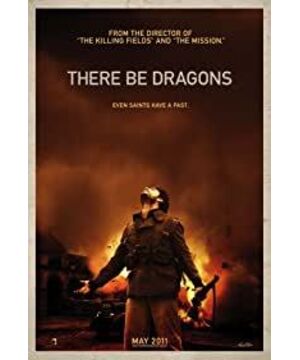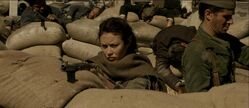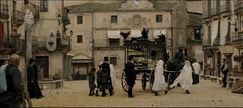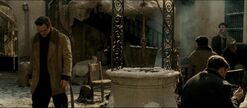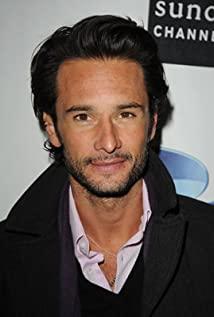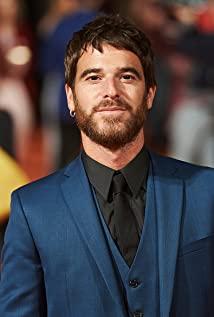The story and characters are all derived from real materials. The whole film is divided into two clues to narrate, one mainly tells the story of Manolo, and the other tells the story of Jose Maria, but the foothold is mainly in Jose Maria. body. The José Maria is the founder of the well-known religious organization Opus Dei (Latin, meaning "God's cause", "Holy cause"), which advocates helping people of all walks of life to consolidate. own faith in God and advocate for the practice of the teachings of Christ in everyday life. Today, the members of Opus Dei are all over the world. Although Jose Maria died in 1975, his career has been carried forward by later generations. Due to his outstanding contributions, Jose Maria himself was consecrated by the Pope in 2002. for saints. It can be seen that Roland Joffe, the screenwriter and director of this film, has a lot of respect for Jose Maria. It is no wonder that Joffe has always been a person with a strong religious complex. It is also the story of missionaries.
Jose Maria was inspired at a very young age to aspire to the priesthood, and soon after graduating from the seminary, he had the idea to create Opus Dei. This is the exact opposite of Manolo - Manolo and Jose Maria have known each other since childhood and attended seminary together, but Manolo has no interest in the priesthood, he is a selfish, ruthless, decisive businessman , For Manolo, protecting himself and reaping the greatest benefits is the true meaning of life, and for this, he is willing to betray, kill, and betray. In general, the film goes back and forth between the two threads of Jose Maria and Manolo, and the biggest dramatic conflict broke out during the Spanish Civil War.
The advent of the war broke the lives of Jose Maria and Manoro, and the opportunist Manoro joined the left-wing resistance army, this team (probably the "international column") gathered revolutionary youth from all over the world. After Leo gave an impassioned speech, the young people walked to the battlefield singing the "Internationale". It was here that Manolo fell in love with Itiko, a revolutionary young woman from Hungary. However, Itiko fell in love with Orio, who was handsome, romantic, and full of revolutionary passion. In private, Manolo was also a spy lurking in the revolutionary ranks, and he secretly reported the coordinates to the government army every day. In order to vent his anger, one day Manolo deliberately left the transmitter next to Itiko and framed it for Itiko.
In order to protect Itiko, Orio committed suicide by drinking a bullet - with his own reputation and life, Orio protected Itiko and the child in her belly.
At this time, Jose Maria was also caught in the greatest crisis of his life. According to the performance in the film, it is not the right-wing government army supported by the fascists, but the left-wing column composed of revolutionary youths, who poses the greatest threat to Jose Maria. The militiamen shouting revolutionary slogans and the rogue proletarians who took advantage of the opportunity to sneak into the ranks seized every opportunity to humiliate, beat and scold the devout priests, and later, they even shot Catholics in the streets without trial— This episode reminds me of Doctor Zhivago.
In order to escape from danger, José Maria began a arduous journey across the Pyrenees. On the way, he experienced a painful debate on theism—faced with endless suffering, God was silent, which made piety What's wrong with Jose Maria? A raped girl's distrust of God further exacerbates Jose Maria's crisis of faith. However, after the divine enlightenment, Jose Maria strengthened her faith in her heart. But to be honest, these apocalyptic insights cannot be perceived by ordinary people. Joffe's shots are beautiful, but they are always lacking in convincing for me.
Manoro witnessed Itiko give birth to the crystallization of her and Orio, and in a near-desperate battle, Manoro shot Itiko with his own hands-according to Manoro, this was his achievement of Itiko. Tiko's wish. Then, Manolo shamelessly survived and adopted the children of Itiko and Orio.
The film begins when the grown-up child returns to bid farewell to Manolo who was dying. The child didn't know his life experience until Manolo died. In the end, the child forgives the murderer of his parents and calls Manolo "the father".
When Jose Maria crossed the border, he was exposed to Manoro's sniper gun for a long time, but Manoro did not fire.
Does this count as Manolo saving Jose Maria's life?
At the last moment of his life, Manolo saw Jose Maria bathed in the Holy Light.
For Jose Maria, his whole life is to fight against various "dragons", but in the end, he also achieved a unique set of eighteen palms for subduing dragons, and let this set of palms flourish and spread to others. .
Manolo was also forgiven, I think.
For Manolo's adopted son, the grudge between Manolo and Jose Maria is a secret from his father's generation. It is a common proposition that a son completes his growth by comprehending the secrets of his parents.
"Secret" moves constantly between the two characters of Jose Maria and Manolo, and the scenes are very large, especially the scenes of the Spanish Civil War, which have an epic feel. It is a pity that it is too rigid in historical facts, the whole film is too loose, the clues are not focused, and the dramatic conflict is not obvious enough, especially the description of Saint Jose Maria, which seems to be more than praised but not enough.
In fact, passionate people feel that their cause is sacred. For example, those young people who sang the "Internationale" and killed the Spanish priest, in their eyes, this kind of killing is also "sacred".
Not to mention, interested friends can go to the official website of the Simplified Chinese version of the "Opus Dei" organization: http://www.opusdei.org.hk/
(Tencent Feature)
————————— ——————————————————
This "Opus Dei" turned out to be the "Opus Dei" in "The Da Vinci Code". Some people believe that Opus Dei advocates a return to conservative Roman Catholic values and encourages believers to make great sacrifices in order to be "God" good deeds". Once they become priests, they must strictly abide by the teachings, do everything in accordance with the "Spirit of Opus Dei", and leave all decisions of life to the Church. It is often referred to as the "Holy Spirit Mafia".
The relevant provisions of the teachings include: swearing of permanent celibacy, turning over income, destroying previous photos, reporting contact with relatives and friends to the supervisor; corporal punishment, including penance and whipping, etc. Pentecost is a belt with metal barbed hooks tied around the thighs for two hours a day, all day on Sunday; whipping is the flogging of one's back and buttocks with knotted rope once a week.
Bishop Aringarosa in "The Da Vinci Code" and Albino Silas are both members of Opus Dei, and the canonization of Jose Maria has also caused huge controversy. Some people think that this person is far from friendly. generation. He had a surly temperament, and it was unbearable for anyone to show even the slightest antipathy to Opus Dei, even Popes John XXIII and Paul VI. One widely held view is that canonizing him damages the entire church system.
The 2011 Shanghai International Film Festival has a very heavy taste!
View more about There Be Dragons reviews


